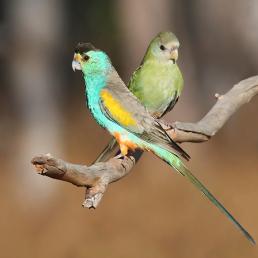

Join BirdNote tomorrow, November 30th!
Illustrator David Sibley and actor H. Jon Benjamin will face off in the bird illustration battle of the century during BirdNote's Year-end Celebration and Auction!
If you feed birds, avoid doing more harm than good.
Feeding wildlife can be beneficial if properly done, but it always carries the potential for upsetting the natural balance between native predators and prey species. Improper feeding can help to spread disease, support predator populations that prey on birds and other organisms, or increase non-native populations that displace the natives.
• Feeder placement should be away from shrubs or bushes that provide places for cats to ambush birds (Coleman et al. 1997).
• Avoid feeding birds in the spring and summer. Feeding birds supplements their natural diet, but springtime feeding may encourage a lower quality diet for nestlings who need high-protein insects, which are naturally abundant throughout the breeding season.
• Do not supplement the diet of avian nest predators such as jays, magpies, crows and ravens by feeding them during the breeding season. These predators tend to benefit disproportionately from human habitation, and as their populations expand they are negatively affecting the health of other bird populations. The National Audubon Society produces bird feeders that discourage use by avian predators.
• Avoid supplementing the diet of Brown-headed Cowbirds, which parasitize songbird nests. If cowbirds come to your feeder, try eliminating millet from the birdseed you provide. Evidence indicates that Brown-headed Cowbirds are attracted to bird feeders primarily for millet. Sunflower seeds and other types of birdseed attract many songbird species, but may not attract cowbirds.
• When feeding birds in winter, feed them consistently. Some wintering birds may become dependent upon winter bird feeders, thus a consistent supply of food is important. Change birdseed if it gets wet from rain as the moisture may promote mildew or sprouting, which can cause birds to become ill.
• In feeding hummingbirds, use a solution of four parts water to one part sugar. Do not use brown sugar, artificial sweeteners or red dye. Place the feeders in the shade and change the feeder solution every three to four days to avoid cultivating pathogens that can cause hummingbirds to become ill. In freezing weather, bring feeders indoors at dusk and return them with lukewarm fluid at dawn. Clean feeders every 10 days using a few drops of bleach in the wash water [no more than one part bleach to nine parts water], and let stand before rinsing. Rinse thoroughly many times.
From the Oak Woodland Bird Conservation Plan
California Partners in Flight
www.prbo.org/calpif/pdfs/oak.v-2.0.pdf
Here are more ideas about feeding birds in your back yard!
